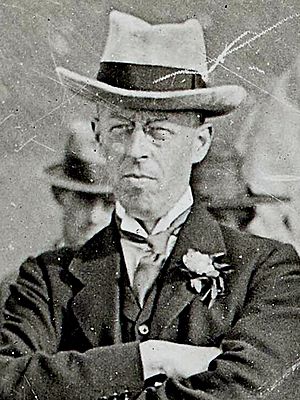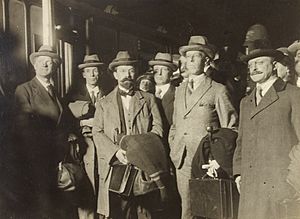Robert Barton facts for kids
Quick facts for kids
Robert Barton
|
|
|---|---|

Barton in 1921
|
|
| Minister for Economic Affairs | |
| In office 26 August 1921 – 9 January 1922 |
|
| Preceded by | New office |
| Succeeded by | Kevin O'Higgins |
| Director of Agriculture | |
| In office 2 April 1919 – 26 August 1921 |
|
| Preceded by | New office |
| Succeeded by | Art O'Connor |
| Teachta Dála | |
| In office May 1921 – June 1923 |
|
| Constituency | Kildare–Wicklow |
| In office December 1918 – May 1921 |
|
| Constituency | Wicklow West |
| Personal details | |
| Born |
Robert Childers Barton
14 March 1881 Annamoe, County Wicklow, Ireland |
| Died | 10 August 1975 (aged 94) Annamoe, County Wicklow, Ireland |
| Political party | Sinn Féin |
| Spouse |
Rachel Warren
(m. 1951; died 1972) |
| Relatives | Erskine Childers (cousin) |
| Alma mater | Christ Church, Oxford |
| Occupation | Landowner |
Robert Childers Barton (born March 14, 1881, died August 10, 1975) was an important Irish politician and farmer. He was also an Irish nationalist, meaning he strongly believed in Ireland's independence. Robert Barton played a key role in the talks that led to the signing of the Anglo-Irish Treaty, a very important agreement for Ireland. His cousin, Erskine Childers, was also a close friend.
Contents
Early Life and Military Service
Robert Barton grew up in County Wicklow, Ireland. His family owned a large estate called Glendalough House. He went to school in England at Rugby and then to Oxford.
When World War I started, he joined the Royal Dublin Fusiliers as an officer. He was in Dublin during the Easter Rising in 1916. After the uprising, he saw many of its leaders who were held prisoner. He felt strongly that the British government was too harsh. Because of this, he quit his job in the army. He then joined the Irish Republican Brotherhood, a group working for Irish independence.
Political Career and Imprisonment
In the 1918 Irish general election, Robert Barton was chosen to represent Wicklow West for the Sinn Féin party. Instead of going to the British Parliament, he joined other Sinn Féin members in Dáil Éireann, which was Ireland's own parliament.
In February 1919, he was arrested for speaking out against the government. He famously escaped from Mountjoy Prison on St. Patrick's Day. He even left a note for the prison governor, saying he had to leave because his cell was uncomfortable!
Serving in the Dáil
After his escape, he was made the Director of Agriculture in the Dáil government in April 1919. He was caught again in January 1920 and sentenced to three years in prison. However, he was released early in July 1921 as part of a general pardon.
Before his release, he was elected again in the 1921 Irish elections. This time, he represented Kildare–Wicklow. In August 1921, he became the Secretary for Economic Affairs in the Irish cabinet.
The Anglo-Irish Treaty
Robert Barton was one of the important Irish representatives sent to London to negotiate the Anglo-Irish Treaty. His cousin, Erskine Childers, worked as a secretary for the Irish team.
Barton signed the Treaty on December 6, 1921, even though he was not fully happy about it. He said he signed it because it was "the lesser of two outrages." This meant he felt it was the better choice between two difficult options.
After the Treaty
Even though he signed the Treaty, he later ran for election in June 1922 as an Anti-Treaty Sinn Féin candidate. He was the only person who had signed the Treaty to do this. He won a seat in the Third Dáil. However, like other Anti-Treaty members, he did not take his seat in parliament.
In October 1922, he was appointed Minister for Economic Affairs in a "shadow government" led by Éamon de Valera. This government was against the official Provisional Government. Barton was arrested and held for most of the Irish Civil War at the Curragh Camp.
Later Life and Legacy
Robert Barton lost his seat in the 1923 Irish general election. After this, he left politics and became a barrister, which is a type of lawyer. He later became a judge. From 1934 to 1954, he was the chairman of the Agricultural Credit Corporation.
Robert Barton passed away at his home in County Wicklow on August 10, 1975. He was 94 years old. He was the last person alive who had signed the Anglo-Irish Treaty.
Glendalough House
Glendalough House was Robert Barton's family home. He managed it for over 70 years until he died. It is still known as one of Ireland's most important properties. Many political meetings took place there between 1910 and 1922.
The house has also been used as a filming location for famous Hollywood movies. These include Excalibur, Saving Private Ryan, and Braveheart.
Robert Barton's great-great-grandfather, Thomas Barton, also from Glendalough House, started the famous Langoa & Barton vineyards in France. The Barton family has owned these vineyards since 1836.
Images for kids
 | William L. Dawson |
 | W. E. B. Du Bois |
 | Harry Belafonte |




